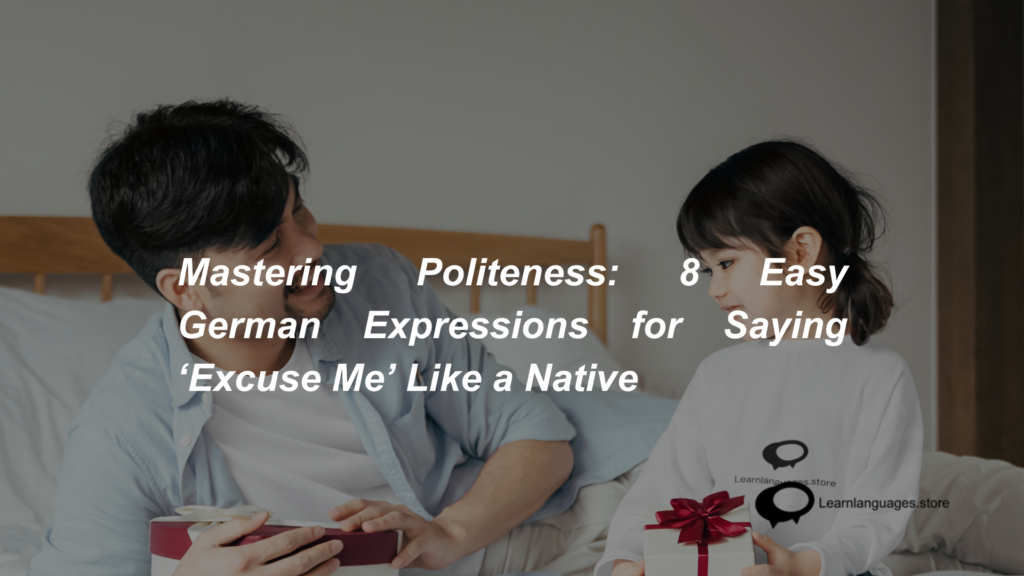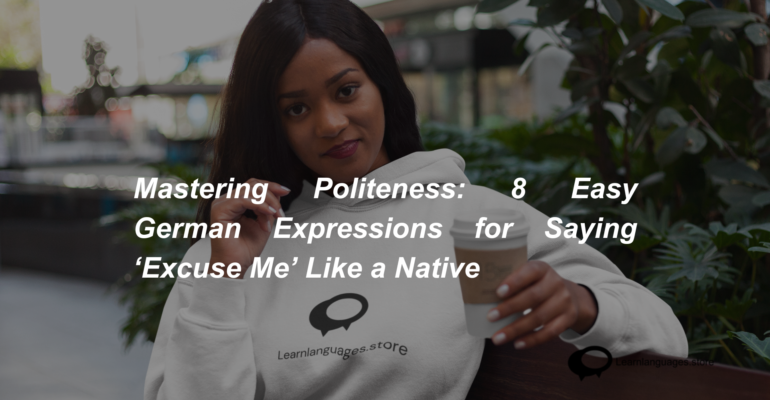Mastering Politeness: 8 Easy German Expressions for Saying ‘Excuse Me’ Like a Native
Mastering Politeness: 8 Easy German Expressions for Saying ‘Excuse Me’ Like a Native
Estimated reading time: 8 minutes
When learning a new language, mastering polite expressions is a key part of sounding natural and blending in with native speakers. In German, saying “excuse me” is not only about good manners but also about effectively catching someone’s attention or asking for a small favor. Whether you’re navigating a bustling city, requesting help in a store, or simply trying to pass someone in a crowded place, knowing how to say “excuse me” in German will make your interactions smoother and more pleasant.
In this blog, we’ll explore eight easy German expressions to say “excuse me” and break down when and how to use each one. We’ll also provide English translations and examples to help you understand and use these phrases confidently.

1. Entschuldigung!
Translation: Excuse me! / Sorry!
When to use it:
“Entschuldigung!” is the most common and versatile way to say “excuse me” in German. You can use it in almost any situation where you would use “excuse me” in English. Whether you’re trying to get someone’s attention, apologize for bumping into someone, or ask for directions, this phrase works well.
Examples:
- Entschuldigung, können Sie mir bitte sagen, wo der Bahnhof ist?
Excuse me, can you please tell me where the train station is? - Entschuldigung, ich habe Sie nicht gesehen.
Sorry, I didn’t see you.
Additional tip: To make the expression more formal, you can add “bitte” (please) at the end: “Entschuldigung, bitte!”
2. Verzeihung!
Translation: Pardon! / Excuse me!
When to use it:
“Verzeihung!” is a bit more formal than “Entschuldigung” and is often used when you need to apologize in a more serious manner or when you accidentally do something that might have caused discomfort to others. It can also be used to politely interrupt someone or draw attention to yourself.
Examples:
- Verzeihung, dass ich Sie unterbreche, aber ich habe eine Frage.
Pardon me for interrupting, but I have a question. - Verzeihung, das war nicht meine Absicht.
Excuse me, that was not my intention.
Additional tip: Use “Verzeihung” when you want to sound particularly polite or respectful.
3. Entschuldigen Sie bitte!
Translation: Excuse me, please!
When to use it:
This expression is a more formal and polite variation of “Entschuldigung.” It is often used in professional settings or when addressing someone you don’t know very well. Adding “bitte” (please) at the end softens the request and makes it sound more courteous.
Examples:
- Entschuldigen Sie bitte, könnten Sie mir helfen?
Excuse me, please, could you help me? - Entschuldigen Sie bitte die Störung.
Excuse me, please, for the disturbance.
Additional tip: This phrase is ideal for formal situations, such as in business or when addressing authority figures.
4. Könnten Sie bitte… ?
Translation: Could you please…?
When to use it:
This phrase is used to politely ask someone for a favor or assistance. It’s a great way to preface a request, making it clear that you’re asking for help while being respectful.
Examples:
- Könnten Sie bitte die Tür öffnen?
Could you please open the door? - Könnten Sie bitte kurz warten?
Could you please wait a moment?
Additional tip: This phrase is very polite and is suitable for any situation where you need to ask for something, especially from someone you don’t know well.
5. Darf ich…?
Translation: May I…?
When to use it:
“Darf ich…?” is a polite way to ask for permission to do something. It’s a bit more formal and is often used when you’re seeking consent or trying to be particularly considerate.
Examples:
- Darf ich vorbeigehen?
May I pass by? - Darf ich Sie etwas fragen?
May I ask you something?
Additional tip: This expression shows respect for the other person’s space or time, making it perfect for situations where courtesy is important.
6. Entschuldigen Sie die Unannehmlichkeiten.
Translation: Please excuse the inconvenience.
When to use it:
This phrase is commonly used in formal or business contexts, especially when you need to apologize for something that has caused someone else inconvenience. It’s a polite way to acknowledge that your actions (or inactions) have caused a problem.
Examples:
- Entschuldigen Sie die Unannehmlichkeiten, die Ihnen entstanden sind.
Please excuse the inconvenience caused to you. - Wir bitten Sie, die Unannehmlichkeiten zu entschuldigen.
We ask you to excuse the inconvenience.
Additional tip: This phrase is often used in written communication, such as emails or letters, but can also be used in spoken language in formal situations.
7. Entschuldigen Sie, darf ich kurz stören?
Translation: Excuse me, may I disturb you for a moment?
When to use it:
This expression is useful when you need to interrupt someone politely, whether they’re working, talking, or otherwise engaged. It’s a considerate way to ask for someone’s attention without being intrusive.
Examples:
- Entschuldigen Sie, darf ich kurz stören? Ich hätte eine Frage.
Excuse me, may I disturb you for a moment? I have a question. - Entschuldigen Sie, darf ich kurz Ihre Zeit in Anspruch nehmen?
Excuse me, may I take up a bit of your time?
Additional tip: This phrase is particularly effective in environments where people are focused, such as in offices or meetings.
-
Product on sale
 German B1
German B1₹32,600.00
₹36,300.00 -
Product on sale
 German A2
German A2₹18,300.00
₹24,300.00
8. Verzeihen Sie mir.
Translation: Forgive me.
When to use it:
“Verzeihen Sie mir” is a very formal and somewhat old-fashioned way of saying “excuse me.” It’s often used in situations where you’re asking for forgiveness or acknowledging that you’ve made a mistake.
Examples:
- Verzeihen Sie mir, das war unhöflich von mir.
Forgive me, that was rude of me. - Verzeihen Sie mir, ich wollte nicht stören.
Forgive me, I didn’t mean to disturb you.
Additional tip: While not as commonly used in everyday conversation, this phrase is useful in formal apologies or when you want to show deep respect and regret.
Final Thoughts: Speak with Confidence
Learning these eight German expressions to say “excuse me” will significantly enhance your ability to communicate politely and effectively in German-speaking environments. Whether you’re traveling, working, or simply interacting with German speakers, these phrases will help you navigate social situations with confidence and grace.
Remember, language learning is about more than just vocabulary—it’s about understanding cultural nuances and using the right expressions in the right contexts. By mastering these polite phrases, you’ll not only improve your German but also make a positive impression on those you interact with.
So, the next time you find yourself in a situation where you need to say “excuse me,” try using one of these expressions. With practice, you’ll soon be speaking like a native!
Bonus Tip: To deepen your understanding of these phrases and their proper usage, try listening to native German speakers in everyday situations. Watching German movies, TV shows, or listening to German podcasts can provide valuable context and help reinforce what you’ve learned.
Contact Us
To learn more about our paid courses, feel free to reach out to us:
Address:
330, 3rd Floor, Big Splash (Near Vashi Bus Depot),
Sector 17,
Vashi,
Navi Mumbai, Maharashtra 400703
Phone: +91-9594113111
Email: services@learnlanguages.store
Don’t miss this opportunity to enhance your German skills! Sign up today, and let’s start this language-learning journey together!










